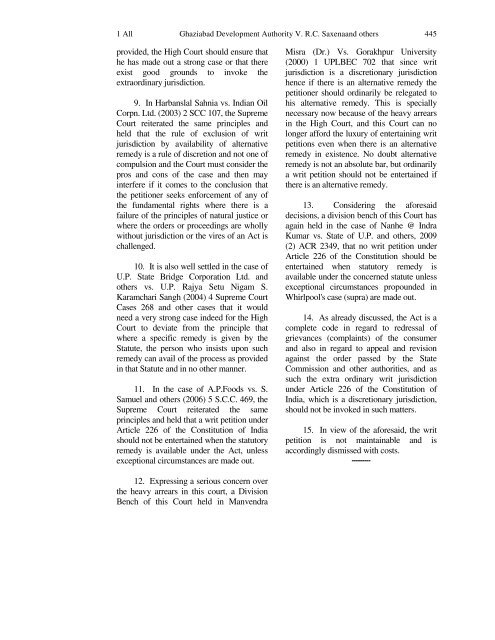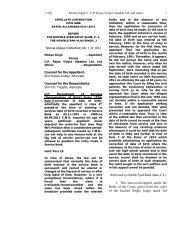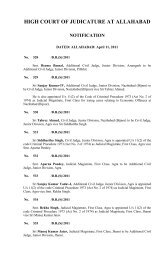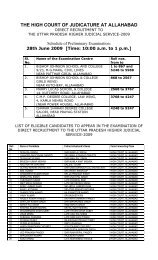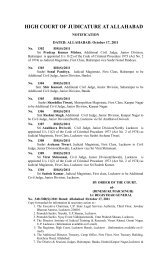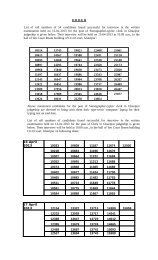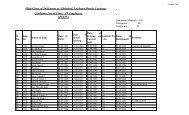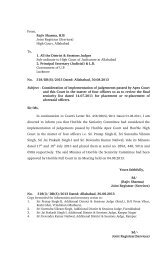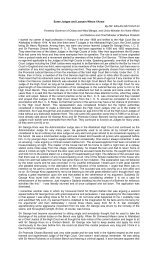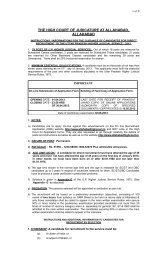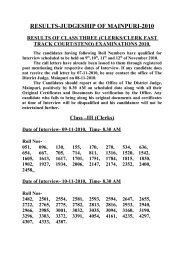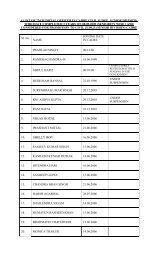Apr - High Court of Judicature at Allahabad
Apr - High Court of Judicature at Allahabad
Apr - High Court of Judicature at Allahabad
You also want an ePaper? Increase the reach of your titles
YUMPU automatically turns print PDFs into web optimized ePapers that Google loves.
1 All Ghaziabad Development Authority V. R.C. Saxenaand others 445<br />
provided, the <strong>High</strong> <strong>Court</strong> should ensure th<strong>at</strong><br />
he has made out a strong case or th<strong>at</strong> there<br />
exist good grounds to invoke the<br />
extraordinary jurisdiction.<br />
9. In Harbanslal Sahnia vs. Indian Oil<br />
Corpn. Ltd. (2003) 2 SCC 107, the Supreme<br />
<strong>Court</strong> reiter<strong>at</strong>ed the same principles and<br />
held th<strong>at</strong> the rule <strong>of</strong> exclusion <strong>of</strong> writ<br />
jurisdiction by availability <strong>of</strong> altern<strong>at</strong>ive<br />
remedy is a rule <strong>of</strong> discretion and not one <strong>of</strong><br />
compulsion and the <strong>Court</strong> must consider the<br />
pros and cons <strong>of</strong> the case and then may<br />
interfere if it comes to the conclusion th<strong>at</strong><br />
the petitioner seeks enforcement <strong>of</strong> any <strong>of</strong><br />
the fundamental rights where there is a<br />
failure <strong>of</strong> the principles <strong>of</strong> n<strong>at</strong>ural justice or<br />
where the orders or proceedings are wholly<br />
without jurisdiction or the vires <strong>of</strong> an Act is<br />
challenged.<br />
10. It is also well settled in the case <strong>of</strong><br />
U.P. St<strong>at</strong>e Bridge Corpor<strong>at</strong>ion Ltd. and<br />
others vs. U.P. Rajya Setu Nigam S.<br />
Karamchari Sangh (2004) 4 Supreme <strong>Court</strong><br />
Cases 268 and other cases th<strong>at</strong> it would<br />
need a very strong case indeed for the <strong>High</strong><br />
<strong>Court</strong> to devi<strong>at</strong>e from the principle th<strong>at</strong><br />
where a specific remedy is given by the<br />
St<strong>at</strong>ute, the person who insists upon such<br />
remedy can avail <strong>of</strong> the process as provided<br />
in th<strong>at</strong> St<strong>at</strong>ute and in no other manner.<br />
11. In the case <strong>of</strong> A.P.Foods vs. S.<br />
Samuel and others (2006) 5 S.C.C. 469, the<br />
Supreme <strong>Court</strong> reiter<strong>at</strong>ed the same<br />
principles and held th<strong>at</strong> a writ petition under<br />
Article 226 <strong>of</strong> the Constitution <strong>of</strong> India<br />
should not be entertained when the st<strong>at</strong>utory<br />
remedy is available under the Act, unless<br />
exceptional circumstances are made out.<br />
Misra (Dr.) Vs. Gorakhpur University<br />
(2000) 1 UPLBEC 702 th<strong>at</strong> since writ<br />
jurisdiction is a discretionary jurisdiction<br />
hence if there is an altern<strong>at</strong>ive remedy the<br />
petitioner should ordinarily be releg<strong>at</strong>ed to<br />
his altern<strong>at</strong>ive remedy. This is specially<br />
necessary now because <strong>of</strong> the heavy arrears<br />
in the <strong>High</strong> <strong>Court</strong>, and this <strong>Court</strong> can no<br />
longer afford the luxury <strong>of</strong> entertaining writ<br />
petitions even when there is an altern<strong>at</strong>ive<br />
remedy in existence. No doubt altern<strong>at</strong>ive<br />
remedy is not an absolute bar, but ordinarily<br />
a writ petition should not be entertained if<br />
there is an altern<strong>at</strong>ive remedy.<br />
13. Considering the aforesaid<br />
decisions, a division bench <strong>of</strong> this <strong>Court</strong> has<br />
again held in the case <strong>of</strong> Nanhe @ Indra<br />
Kumar vs. St<strong>at</strong>e <strong>of</strong> U.P. and others, 2009<br />
(2) ACR 2349, th<strong>at</strong> no writ petition under<br />
Article 226 <strong>of</strong> the Constitution should be<br />
entertained when st<strong>at</strong>utory remedy is<br />
available under the concerned st<strong>at</strong>ute unless<br />
exceptional circumstances propounded in<br />
Whirlpool's case (supra) are made out.<br />
14. As already discussed, the Act is a<br />
complete code in regard to redressal <strong>of</strong><br />
grievances (complaints) <strong>of</strong> the consumer<br />
and also in regard to appeal and revision<br />
against the order passed by the St<strong>at</strong>e<br />
Commission and other authorities, and as<br />
such the extra ordinary writ jurisdiction<br />
under Article 226 <strong>of</strong> the Constitution <strong>of</strong><br />
India, which is a discretionary jurisdiction,<br />
should not be invoked in such m<strong>at</strong>ters.<br />
15. In view <strong>of</strong> the aforesaid, the writ<br />
petition is not maintainable and is<br />
accordingly dismissed with costs.<br />
---------<br />
12. Expressing a serious concern over<br />
the heavy arrears in this court, a Division<br />
Bench <strong>of</strong> this <strong>Court</strong> held in Manvendra


